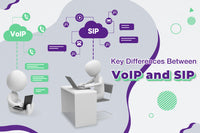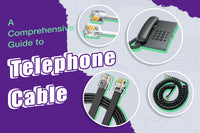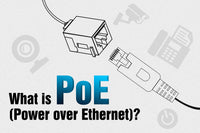Contents
A reliable voice communication system is vital for a business’s success. However, selecting the correct phone system can be a troublesome thing for many businesses. There are traditional PBX, hosted PBX, and VoIP PBX for voice communications. Some people may regard PBX as the traditional PBX, and some think it is a technical term for phone systems. When people compare PBX and VoIP, they are actually talking about the differences between different PBX systems.
Unlike the traditional PBX phone system, the new VoIP phone system transmits voice data based on the internet. Each phone system has its own pros and cons. In this blog, we will give you an in-depth analysis to help you find the proper phone system for your business.
What is a PBX Phone System?
PBX, standing for Private Branch Exchange is an on-premise phone system that is primarily used in internal communication within a shared network. The traditional PBX system allows employers to make and receive free calls and transfer calls within a business using a telephone line. The telephone line plays an important role in the traditional PBX phone system as it connects the central network to the business devices and also links to PBX boxes containing switches. These switches facilitate both internal and external voice communications. A traditional PBX system provides some basic features like call forwarding and voicemail.
With advancements in technology, PBX systems have evolved beyond the traditional PBX systems. For example, an on-site IP PBX system is a VoIP system that offers flexibility by connecting phone systems over the internet. VoIP PBX system connects Ethernet cables to phones, which is easy to set up. The hosted or cloud-based PBX system is a great option for large-scale businesses with locations around different regions and countries.
What is VoIP?
VoIP is an abbreviation for “Voice over Internet Protocol” and works by transferring voice data over the internet. The VoIP system converts your voice signals into data packets and sends them to a VoIP provider in real time. Then the VoIP provider converts them back and sends them to the receiver’s phone. With a stable internet connection, VoIP can provide high-quality and scalable voice communication with many advanced features like HD voice and call analytics. The sound quality of VoIP depends on the bandwidth and related devices.
What is VoIP PBX?
VoIP PBX, also called IP PBX or Private Branch Exchange, is an improved version of analog PBX. It is a telephone system used in business to transmit voice via Internet Protocol (IP) network. The IP-based phone system uses session initiation Protocol (SIP) trunking, making and receiving calls over internet while maintaining analog transmission in internal audio communications. This PBX system offers great flexibility, reducing the number of physical phone lines. Switching from a traditional PBX system to a VoIP PBX system helps businesses benefit from advanced features like voice messaging and video conferencing.
PBX Phone System vs. VoIP: What Are the differences?

When comparing the PBX phone system and VoIP, we are actually evaluating traditional PBX systems against VoIP systems. Here are some key differences:
Cost
The implementation of the traditional PBX phone system requires a large amount of upfront investment for PBX equipment including servers, routers, VoIP gateways, software, analog phones, and other hardware. Installation, maintenance, and upgrades also add to the overall cost.
As for VoIP, with the existing IP infrastructure, it primarily requires the expenses for IP phones. So the initial costs are lower than PBX but the overall investment may be affected by internet connectivity and service provider costs.
Features
Both of them provide some basic phone features like voicemail and voice calling. However, VoIP extends beyond these basics by offering more advanced features, such as video conferencing, instant messaging, and integration with Customer Relationship Management (CRM) system.
Some VoIP providers also offer features like contact center and call analytics. VoIP is also more flexible than PBX in terms of hardware requirements.
Scalability
Expanding a PBX system is costly as it requires the installation of new phone lines and hardware. In contrast, a VoIP system is typically license-based and offers high scalability. When the license is created, you just need to purchase more IP phones and add or remove phone lines based on the scale of your business. You can also easily upgrade your current routers or phones and use the same VoIP plan in different offices.
Maintenance and Upgrades
When working with a PBX system, your business requires regular maintenance and upgrades by your IT team. You need to ensure that you own a skilled and knowledgeable IT team. But if you use hosted VoIP, the responsibility of maintaining, troubleshooting, and upgrading your phone system is transferred to the VoIP provider. The VoIP provider can help solve all of your phone system problems with their own team.
Call Quality and Reliability
When it comes to call quality, a traditional PBX system relies on physical hardware like routers and phone models. The proper installation of a PBX setup is essential for high-quality calls.
There are many factors that can affect the call quality in a VoIP system. A slow and unstable network speed and incorrect configuration can cause a low sound quality. However, if all infrastructure is correct, the VoIP system provides a more high-quality call than the traditional PBX system.
Security
Security is no doubt a big concern for businesses when implementing a phone system, whether it is a PBX or VoIP phone system. A PBX is immune to network threats like data breaches and hacker attacks but is vulnerable to physical intrusions and extreme weather.
A VoIP system is susceptible to network threats, but its security can be enhanced by using strong passwords, call encryption, and robust firewalls.
|
Comparison |
Traditional PBX Phone System |
VoIP Phone System |
|
Cost |
High upfront costs for PBX setups |
Primarily expenses for IP phones |
|
Features |
Basic communications features like voicemail and voice calling |
Advanced features like instant messaging and CRM integration |
|
Scalability |
Low scalability, requires additional equipment and phone lines |
High scalability |
|
Maintenance and Upgrades |
By own IT team |
By VoIP provider |
|
Call Quality |
Can provide quality calls but relies on quality physical hardware |
Can provide high-quality calls but heavily relies on a stable internet and power supply |
|
Security |
Immune to network threats but vulnerable to physical intrusion and extreme weather |
Susceptible to hacker attacks |
PBX vs. VoIP: Which One to Choose?
So, how do you choose the right phone system for your business? Here are some key considerations to help you make a decision.
If you own a small company with a limited budget for investing in a phone system and no plan for future upgrades, maintaining your current traditional PBX phone system might be the practical option. But if you’re planning to expand your businesses and team, opting for a VoIP system can be a wise choice. The VoIP system provides greater flexibility, scalability, and cost-effectiveness that can meet your evolving business needs.
If your team is distributed across different regions and areas, VoIP is the best solution as it allows for calls from anywhere. Your employees can make calls anywhere in the world, ensuring seamless connectivity and collaboration.
In addition, if you want to integrate your phone system with various business apps, VoIP can benefit you a lot.
You also need to consider the communications features required for your business. If your needs are limited to basic features like call forwarding and voicemail, PBX can suffice your needs. If you are looking for more features, a VoIP system is better suited for you since it comes with advanced features such as call analytics, CMR integration, and auto attendant.
Summary
Opting for the right phone system is important for your business. Both PBX and VoIP have their own pros and cons. The PBX phone system is reliable but requires costly equipment and offers fewer features, while VoIP is flexible and scalable but heavily relies on a reliable internet connection. But generally, VoIP is a future-proofing option for your growing business needs.
FAQs
1. Is VoIP better than PBX?
It depends on your specific business needs. VoIP usually offers great flexibility and advanced features, while PBX allows for reliability and security. If you have a small business, A PBX will suffice. But if you need a phone system for your evolving business needs, opt for VoIP.
2. What is the difference between PBX and Cloud-based PBX System?
A traditional PBX system is hardware-based and routes phone calls over standard phone lines while a Cloud-based PBX system works over the internet and manages the off-site phone system by a cloud PBX provider.
3. What is the difference between a PBX and a PABX?
A private branch exchange (PBX) refers to a manually operated PBX system that handles internal calls through a routing console while a private automatic branch exchange (PABX) system is automatically operated and can run automated switchboards.
For more information on this topic, you can keep up on our blogs. While VCELINK offers general and basic information for our customers and other visitors to the website, it’s not professional advice.



Be the first one to comment.
Leave a comment